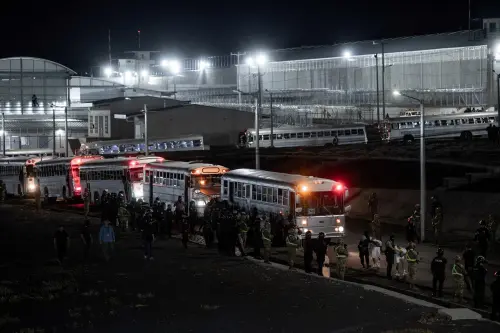The Trump administration recently contended that two planes carrying Venezuelan deportees did not breach a judge's order to pause such removals, as it defended its use of a seldom-invoked wartime authority.
U.S. District Judge James Boasberg had instructed Justice Department lawyers to provide justification for the administration's failure to return flights carrying alleged Venezuelan gang members deported to El Salvador on March 15, despite his order blocking such deportations for two weeks. The administration maintained that the deportations were conducted under the Alien Enemies Act of 1798.
In a court filing, Justice Department lawyers reiterated that the flights had exited U.S. airspace by the time Boasberg issued a written order at 7:25 p.m. ET, hence they were not obligated to return. The attorneys also minimized the significance of Boasberg's earlier oral order during a hearing, where he requested that related planes be turned around.
While Boasberg sought clarification on the timing of the flights and the number of Venezuelans aboard to determine whether the administration violated his order, the Justice Department did not provide this information.
The judge offered the administration the option to invoke the state secrets privilege, which limits the disclosure of sensitive information in civil cases, and justified its decision to do so. In court documents filed late on Monday, the Justice Department stated it would invoke the privilege, arguing that Boasberg's inquiry constituted judicial overreach that infringed on the executive branch's authority regarding diplomatic and national security matters.
"Disclosure of this information could reasonably be expected to cause significant harm to the foreign relations interests of the United States," Secretary of State Marco Rubio stated in a declaration filed with the judge.
Lawyers representing the Venezuelan migrants challenging the deportations have until March 31 to respond. Boasberg has warned of potential repercussions if he finds that the administration violated his order but has not specified what those might be.
The case has become a significant test of the administration's deportation policies. With the Republican Party holding a majority in both the House of Representatives and Senate and generally aligning with the president's agenda, federal judges have frequently served as the primary check on Trump's executive actions.
After Boasberg temporarily halted deportations, Trump called for the judge's impeachment, a process that could lead to his removal. In response, U.S. Chief Justice John Roberts issued a rare statement asserting that appeals, rather than impeachment, are the appropriate mechanism for addressing disagreements with judicial decisions.
This month, Trump invoked the Alien Enemies Act to justify the removal of individuals associated with the Venezuelan gang Tren de Aragua without final removal orders from immigration judges, which are typically required.
Boasberg had suspended those deportations, noting that it was unclear whether the gang's presence in the United States constituted an act of war by a foreign nation as described in the act. The Alien Enemies Act has only been invoked three times in U.S. history, most recently during World War II to intern and remove Japanese, German, and Italian immigrants.
Family members of many deported Venezuelan migrants voiced concerns. Lawyers for one deportee, a professional soccer player and youth coach, claimed U.S. officials mislabeled him as a gang member based solely on a crown tattoo intended to signify his support for Real Madrid.
A hearing took place before a three-judge panel of the U.S. Court of Appeals for the District of Columbia Circuit regarding the administration's effort to suspend enforcement of Boasberg's order. During the contentious hearing, U.S. Circuit Judge Patricia Millett remarked that the Venezuelans deported had not been granted due process to contest the administration's claims that they were members of Tren de Aragua.
"Nazis received better treatment under the Alien Enemies Act than what has occurred here," Millett stated, to which Justice Department lawyer Drew Ensign responded, "We certainly dispute the Nazi analogy."
The D.C. Circuit panel did not indicate when it would issue a ruling.
